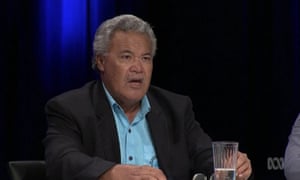Special episode of the ABC show featuring Pacific leaders was dominated by climate crisis and Australia’s response
The former prime minister of Tuvalu, Enele Sopoaga, who hosted Pacific leaders including Scott Morrison and Jacinda Ardern at the Pacific Islands Forum
in August has told a special Pacific edition of Q&A he was “taken
aback” by Scott Morrison’s behaviour in the diplomatic meetings.
“Unfortunately prime minister Scott Morrison of Australia [was] expressing views that completely denies there is climate change happening already in the Pacific. As chairman I was taken a little bit aback,” he said.
“There was some strong resistance on the call from Pacific Island leaders for more concrete works to reduce greenhouse gases, but to particularly cut down and stop new coalmines in Australia.”
The ABC filmed the episode at the University of South Pacific in
Fiji’s capital of Suva earlier on Monday, the first time Q&A has
been filmed in the Pacific, and one of the few times the program has
been filmed outside Australia.“Unfortunately prime minister Scott Morrison of Australia [was] expressing views that completely denies there is climate change happening already in the Pacific. As chairman I was taken a little bit aback,” he said.
“There was some strong resistance on the call from Pacific Island leaders for more concrete works to reduce greenhouse gases, but to particularly cut down and stop new coalmines in Australia.”
The episode was dominated by the climate emergency, as Pacific leaders spoke of the impact on their nations and challenged Australia on its response.
“I certainly hope that not only the Pacific, but those that have polluted the atmosphere and caused global warming will come to react and do the right thing in response to the special report.”
Virisila Buadromo, an advocate for women’s and human rights in Fiji, urged Australia to take more action.
“I think Australia, as the largest country in the region, the richest country in the region, as well as, you also happen to be the largest emitter of carbon in the region, I think that it’s important that if you are part of our family, you need to stand with our family … to fight against climate change.”
I’m Australian. Australia is one of the leaders in the Pacific. Why isn’t the Australian government taking stronger action on climate change? #QandA
“Australia does do a lot on climate change internationally and here in the Pacific as well and we take it very seriously,” he said. “We’re going to meet our targets in Paris, we’ve met our targets in Kyoto, we’re going to reduce emissions by 26-28% by 2030 on our 2005 levels, this year we’ll have about 20% of our power generated by renewables and we hope that to be a third by 2020.”
While the Fijian attorney general, Aiyaz Sayed-Khaiyum, was more diplomatic towards Australia, saying that Fiji recognised countries had their own political and economic imperatives, he added: “We need first of all everyone to recognise that actually coalmining is detrimental to the environment, creates climate events and then we need to have a game plan, the game plan is to have a carbon-neutral economy by 2050.”
The conversation also touched on illegal fishing; the increased rates of hard drug use and addiction in the Pacific, which is used as a transit point for drugs trafficked to Australia; the influence of China in the region; and the outbreak of measles, which has particularly devastated Samoa, killing 53 people.
On China, Alex Hawke said Australia was happy to work with any international partners in the region who had the Pacific’s best interest at heart, and that Australia wasn’t threatened by China’s presence as long as China was focusing on things like health and education and the region’s economic prosperity. “We don’t look at the region through a geo-strategic lens,” he said.
“This is the Pacific’s time, there’s certainly a lot of interest in the Pacific and we do have to take account, as a united people in this region, of how to use this time to do better for people in the Pacific, but that doesn’t mean compromising values and sovereignty and I think that’s sometimes where there’s a difference in behaviour. I think people in the Pacific are very savvy people about working out who is coming into the region with their agenda in mind, their priorities in mind versus what’s good for the Pacific countries.”
The panel was also asked by an audience member about violence against women. The Pacific has the highest rates of violence against women in the world.
Tony Jones threw the question to Buadromo, who quipped: “Because I’m the feminist and I work in women’s rights the assumption is I’m the one who should be combatting violence against women?”
How can we overcome the traditional expectations of women’s “submissiveness” as a factor in growing cases of violence against women? 1/2 #QandA
“There is a psyche that is perpetuated by your government, your prime minister has perpetuated this psyche where violence is OK, because as we’ve seen in the last couple of weeks, in the last year there have been repeated incidents of people being beaten up by security forces,” she said.
Jones ended the program with a joke at Hawke’s expense, as the minister thanked the ABC for hosting the program in Fiji and said he hoped to see much more of the ABC in the region, with Jones saying: “Give us the funds and we’ll be back.”


No comments:
Post a Comment